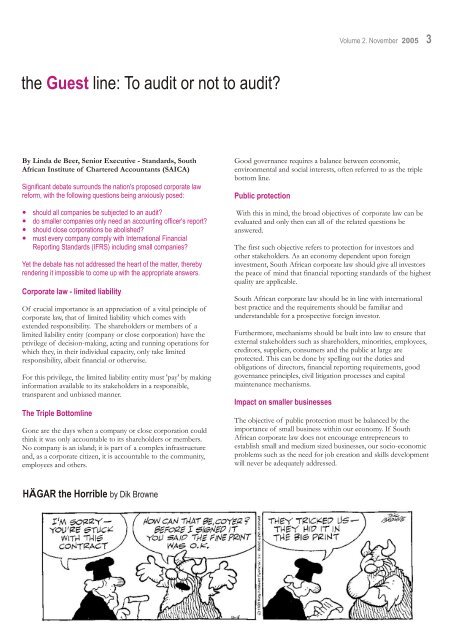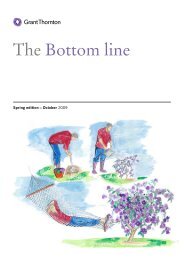IFRS - there's nowhere to hide - Grant Thornton
IFRS - there's nowhere to hide - Grant Thornton
IFRS - there's nowhere to hide - Grant Thornton
You also want an ePaper? Increase the reach of your titles
YUMPU automatically turns print PDFs into web optimized ePapers that Google loves.
Volume 2. November 2005 3<br />
the<br />
Guest<br />
line: To audit or not <strong>to</strong> audit<br />
By Linda de Beer, Senior Executive - Standards, South<br />
African Institute of Chartered Accountants (SAICA)<br />
Significant debate surrounds the nation's proposed corporate law<br />
reform, with the following questions being anxiously posed:<br />
<br />
<br />
<br />
<br />
should all companies be subjected <strong>to</strong> an audit<br />
do smaller companies only need an accounting officer's report<br />
should close corporations be abolished<br />
must every company comply with International Financial<br />
Reporting Standards (<strong>IFRS</strong>) including small companies<br />
Yet the debate has not addressed the heart of the matter, thereby<br />
rendering it impossible <strong>to</strong> come up with the appropriate answers.<br />
Corporate law - limited liability<br />
Of crucial importance is an appreciation of a vital principle of<br />
corporate law, that of limited liability which comes with<br />
extended responsibility. The shareholders or members of a<br />
limited liability entity (company or close corporation) have the<br />
privilege of decision-making, acting and running operations for<br />
which they, in their individual capacity, only take limited<br />
responsibility, albeit financial or otherwise.<br />
For this privilege, the limited liability entity must 'pay' by making<br />
information available <strong>to</strong> its stakeholders in a responsible,<br />
transparent and unbiased manner.<br />
The Triple Bot<strong>to</strong>mline<br />
Gone are the days when a company or close corporation could<br />
think it was only accountable <strong>to</strong> its shareholders or members.<br />
No company is an island; it is part of a complex infrastructure<br />
and, as a corporate citizen, it is accountable <strong>to</strong> the community,<br />
employees and others.<br />
Good governance requires a balance between economic,<br />
environmental and social interests, often referred <strong>to</strong> as the triple<br />
bot<strong>to</strong>m line.<br />
Public protection<br />
With this in mind, the broad objectives of corporate law can be<br />
evaluated and only then can all of the related questions be<br />
answered.<br />
The first such objective refers <strong>to</strong> protection for inves<strong>to</strong>rs and<br />
other stakeholders. As an economy dependent upon foreign<br />
investment, South African corporate law should give all inves<strong>to</strong>rs<br />
the peace of mind that financial reporting standards of the highest<br />
quality are applicable.<br />
South African corporate law should be in line with international<br />
best practice and the requirements should be familiar and<br />
understandable for a prospective foreign inves<strong>to</strong>r.<br />
Furthermore, mechanisms should be built in<strong>to</strong> law <strong>to</strong> ensure that<br />
external stakeholders such as shareholders, minorities, employees,<br />
credi<strong>to</strong>rs, suppliers, consumers and the public at large are<br />
protected. This can be done by spelling out the duties and<br />
obligations of direc<strong>to</strong>rs, financial reporting requirements, good<br />
governance principles, civil litigation processes and capital<br />
maintenance mechanisms.<br />
Impact on smaller businesses<br />
The objective of public protection must be balanced by the<br />
importance of small business within our economy. If South<br />
African corporate law does not encourage entrepreneurs <strong>to</strong><br />
establish small and medium sized businesses, our socio-economic<br />
problems such as the need for job creation and skills development<br />
will never be adequately addressed.<br />
HÄGAR the Horrible by Dik Browne










